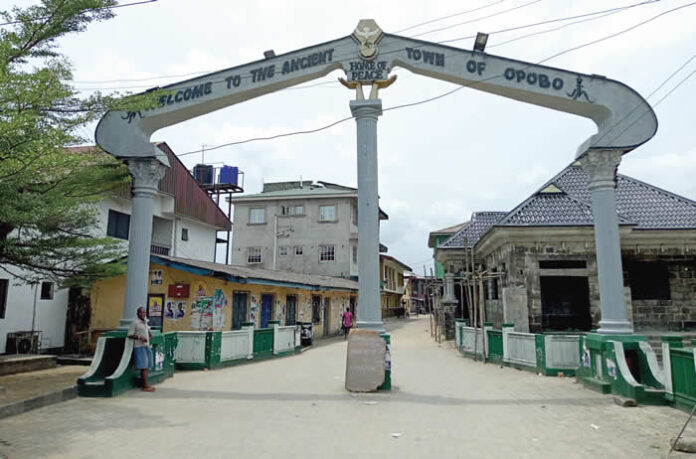EDITOR’S NOTE
*This article presents a meticulously researched response to a recent piece crafted by Vanguard newspaper columnist Emeka Obasi. Focused on the intricate history surrounding Opobo, this Right of Reply penned by writer and public affairs analyst Emeka Amaefula seeks to correct the misinterpretations about Opobo being labeled as an “Igbo outlet.” It stands to correct these inaccuracies by substantively presenting corroborative evidence from historical treaties, compelling archives, and established scholarly works, ensuring that the distinct identity and autonomy of the Opobo Kingdom are appropriately acknowledged.*
*History Distorted*
In his recent article in the Vanguard, my colleague Emeka Obasi attempted to explore the multi-faceted history of the Opobo Kingdom. However, his exploration strayed into inaccuracies, particularly with his assertion that Opobo was essentially an “Igbo outlet.” This claim, undoubtedly meant to provoke thoughtful debate, is historically flawed and cannot be left unchallenged. There is an undeniable need to draw a distinction between the name Opobo, which brings forth images of its notable founder, King Jaja—originally born Jubo Jubogha of Igbo heritage—and the multifaceted kingdom itself.
The history and evolution of the Opobo Kingdom diverge significantly from that of King Jaja, although the interdependencies between the two are evident. Jaja’s leadership indeed served as an impetus for change; yet, the kingdom that materialized and evolved from his endeavors was far beyond the scope of a singular personal narrative. It consisted of the dynamic houses and followers, alliances forged, and socio-political structures that steadfastly endured despite challenges like Jaja’s exile.
*Jaja in Bonny*
Jaja, despite being of Igbo descent, rose to considerable prominence in Bonny, propelled by the House system, a paramount political organization of the Niger Delta. His exemplary leadership skills, remarkable business acumen, and navigational prowess within the intricate trading ecosystems of the Delta brought him substantial recognition. Upon founding Opobo in 1870, Jaja did not transplant his Igbo roots to merely create an extended village. Instead, he emerged as an instrumental Delta leader of notable esteem.
His foundational work in Opobo represented the broader multi-ethnic trading landscape of the Delta, illustrating a dynamic intricacy rather than a simple transplantation from hinterland traditions. Renowned Niger Delta scholar Kay Williamson has eloquently noted that Opobo’s identity was intricately intertwined with the Delta House system, showcasing the cosmopolitan blend of peoples that constituted its leadership.
*Kingdom of Alliances*
Opobo, far from being an isolated ethnic enclave, was a thriving magnet for individuals from diverse backgrounds across the Niger Delta. Its foundational political and social institutions were deeply entrenched in commerce, diplomacy, and alliances rather than being restricted by ethnic homogeneity. By the transformative 1870s, Opobo had evolved into a sovereign trading state, relocating strategic palm oil trade from Bonny to the Imo River while seamlessly controlling substantial commercial avenues leading directly to Liverpool.
*Treaties with Britain*
The remarkable sovereignty of Opobo received acknowledgment from British officials. In 1887, Consul Sir Claude MacDonald notably characterized Opobo as “an independent trading state exercising authoritative control over the Imo River region.” Additionally, in 1884, Britain formalized a treaty with Jaja, respectfully addressing him as “King and Governor of Opobo.” Such records reveal that European merchants, alongside colonial officials, perceived Opobo as an undeniably sovereign kingdom, distinctly separate from Bonny, certainly not an extension of the Igbo hinterland.
These significant agreements went beyond symbolic gestures; they represented genuine acknowledgments by global powers of Opobo’s remarkable nationhood and sovereignty.
*Jaja’s Economic Genius*
Jaja’s remarkable strength lay in his extraordinary economic foresight rather than ethnic mobilization. His strategic elimination of European middlemen allowed Opobo to directly sell palm oil to Liverpool buyers, significantly enhancing the kingdom’s prosperity. Historian E. J. Alagoa documented that by the mid-1870s, Opobo had attained substantial recognition and stature as a Delta kingdom, exporting thousands of tons of palm oil annually. This economic independence provoked British hostility, leading to Jaja’s forced removal and subsequent exile to the West Indies.
*After Jaja’s Exile*
Notwithstanding Jaja’s removal, Opobo demonstrated resilience and adaptability, preventing collapse while its institutions and people upheld their sovereignty with vigor. The enduring legacy of Opobo exemplifies that its existence was far from being singularly tied to Jaja’s person. Instead, it thrived on structures and alliances established by his visionary leadership.
The overarching narrative of Opobo is rooted in resilience and autonomy, rejecting simplistic portrayals as an outlet of another culture. Chronicles emphasize the collective history of the leadership houses, alliances formed, and the sovereignty sustained beyond Jaja’s individual story.
*History Cannot Be Distorted*
If Emeka Obasi’s article aimed to redefine Opobo narrowly as an “Igbo outlet,” the archival evidence soundly contradicts such inaccuracies. The historical reality is crystal clear: Opobo originated from inherent Delta resilience, strategic diplomacy, and robust international recognition.
The rich history of Opobo Kingdom deserves dignified and accurate narration, highlighting its sovereignty as a prominent Niger Delta kingdom. Established by a visionary leader, recognized by global powers of its era, it continues to proudly stand today.
Misleading attempts to distort this history into ethnic simplifications misrepresent readers and disserve the people whose history is defined by admirable independence, resilience, and significant recognition.
History is not subject to fanciful rewrites but stands firm on precise evidence and factual documentation.
✍🏽 By Emeka Amaefula
*Emeka Amaefula is a Port Harcourt City Rivers State Nigeria based Veteran Journalist,writer, author and Public Affairs Analyst*
*+234(0)8111813069*
email: *amaemeka2001@gmail.com*




